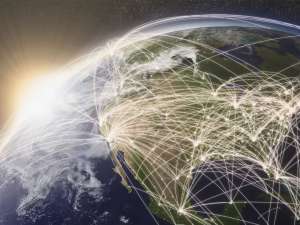
In today’s geopolitical moment, attacks against the privacy of large companies and individuals have become one of the great dangers of life online. Many large organizations have yearly budgets in the millions for security programs and protocols to secure their networks. Ostensibly, they are shielding their customers’ data, but it is also an investment in maintaining a good reputation.
But what if the solution lies in a simple agreement between states?
On Friday, it was Donald Trump himself who discussed, in his first meeting with Russian President Vladimir Putin, jointly forming an “impenetrable Cyber Security unit” to protect the electoral processes from cyberattacks and other dangers that come with being constantly connected to the internet.
Putin & I discussed forming an impenetrable Cyber Security unit so that election hacking, & many other negative things, will be guarded..
— Donald J. Trump (@realDonaldTrump) July 9, 2017
This is not the first time that the subject of cybersecurity has made it to the table. At a time when cyberwarfare has more presence than ever in meetings like the G20, the initiative could have been hailed as timely. And even more so, given that a few months ago it was the Russian president who proposed to the United States to make a cybersecurity agreement after the WannaCry attack that affected thousands of devices around the world.
However, after criticisms were levelled at the president’s continued outreach to Russia, seen both by Democrats and Republicans as an ally that can neither be trusted nor constructive when it comes to cybersecurity, Trump proceeded to cast doubt on the possibility of creating a working relationship. “The fact that President Putin and I discussed a Cyber Security unit doesn’t mean I think it can happen. It can’t-but a ceasefire can,& did!”, he posted in a Tweet from the summit.
The fact that President Putin and I discussed a Cyber Security unit doesn’t mean I think it can happen. It can’t-but a ceasefire can,& did!
— Donald J. Trump (@realDonaldTrump) July 10, 2017
Cyberwarfare on the global agenda
In most cases, when we talk about cyberwarfare, we’re talking about attacks presumably carried out by states, although it is rare to find conclusive evidence about the perpetrator of the attack. Governments are clearer than ever that they should take steps to protect themselves, and in fact Obama made a statement a few months ago acknowledging that much work remains to be done after the White House itself was breached.
Lately, we have seen clear examples of this trend, such as the discovery of an attack in which the DNC’s systems were raided for data, which was later made public in order to hurt the campaign of Democratic candidate Hilary Clinton. While attributing with any certainty who is behind an attack is very complex and often impossible, in this case there’s near-unanimity among experts that Russia was behind the election meddling.
Anyone can fall victim to data theft, and this includes terrorist groups such as ISIS. An ISIS deserted made off with a USB memory containing data on the 22,000 members of ISIS that were required to fill out a form before joining the group.
In March of 2016, South Korea’s intelligence agency reported an attack involving 40 mobile phones belonging to the country’s security agents, accusing North Korea of the attack. Days later the North Korean government denied responsibility,
Initiatives such as the “Hack the Pentagon” rewards program, launched by US Department of Defense, or potential cooperation pacts between major world powers, could be the beginning of a brighter future for global cybersecurity.
The post Cybersecurity Debate on the Agenda at the G20 appeared first on Panda Security Mediacenter.
Article Link: Cybersecurity Debate on the Agenda at the G20